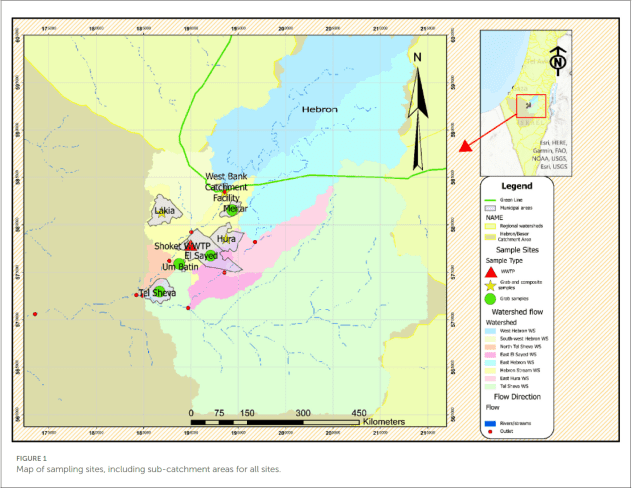Water flushed down the toilet can be an important resource for passively detecting viruses like SARS-CoV-2 and researchers from the Arava Institute’s Center for Transboundary Water Management—including Director of the Center, Dr. Clive Lipchin, and alum Fareed Mahameed—and Ben-Gurion University of the Negev took advantage of this fact for a research study along the Hebron Stream in the Negev. Their recently-published paper concluded that under-testing and asymptomatic transmission in Bedouin communities led to a mismatch between reported coronavirus cases and viral presence in wastewater.
Since much of the prior research on coronavirus in wastewater has been conducted in urban environments, for this study the team of scientists was interested in looking at five municipalities for sampling that varied in their connection to wastewater infrastructure. These included three fully connected to the wastewater grid (Hura, Tel Seva/Tel al-Sabi, Lakia), one partially connected (El Sayed), and one off-grid (Um Batin).
In order to gather data, samples were collected from August 2020 through January 2021 through both grab sampling where wastewater was collected at a single time and continuous sampling that took place automatically over 18 hours. Wastewater was processed using a technique called RT-qPCR, which can measure the concentration of coronavirus RNA in a sample.
In the larger wastewater grid-connected cities, testing the detection of the coronavirus was consistent over time relative to coronavirus tests. However, this was not the case in the less connected communities of El-Sayed and Um Batin. Since the latter Bedouin communities have less access to public health resources like testing and rely on cesspits for their waste, researchers believe that mistrust, misinformation, and stigma contributed to these results. Moving forward, wastewater testing can continue to serve as a passive approach for detecting viruses, but it is not a substitute for providing preventative resources to vulnerable communities.
You can read more about the research in a previous blog post here.
https://arava.org/new-research-on-wastewater-testing-for-covid-19-in-bedouin-communities/

